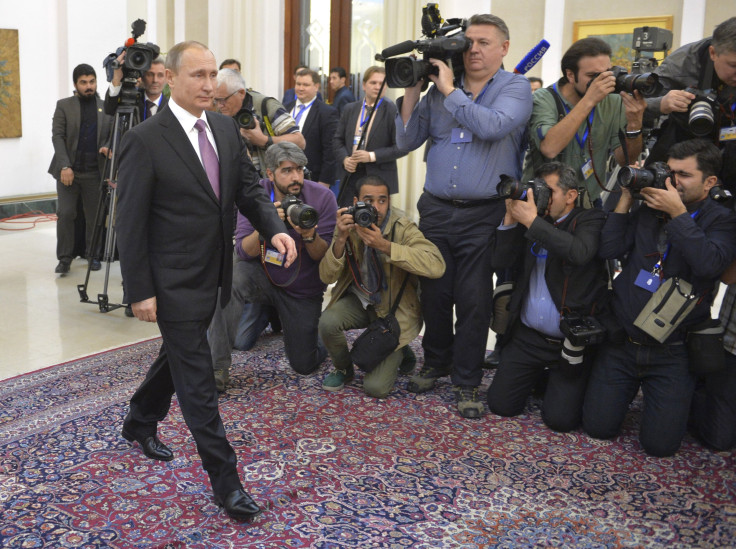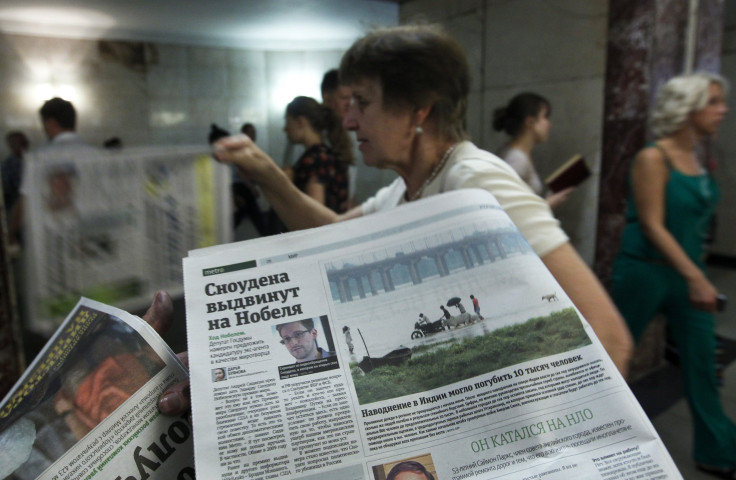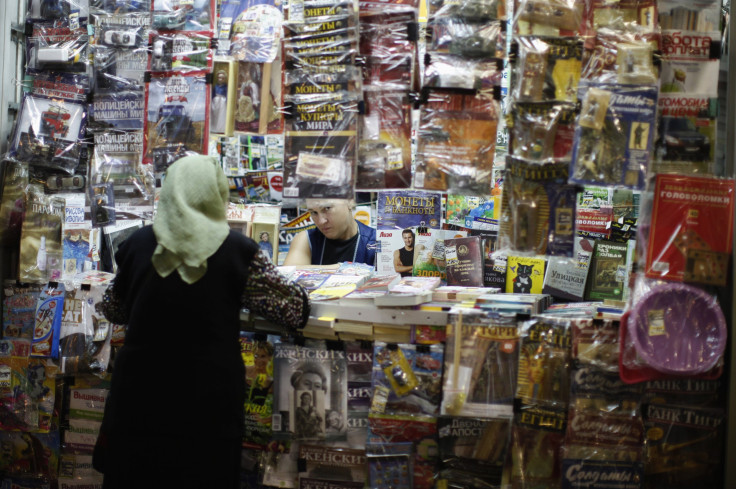Kremlin Loyalists Wrest Control Of Russian Media As Foreign Owners Flee, New Restrictions On Foreign Ownership

MOSCOW -- Tatyana Lysova has worked at Vedomosti, Russia’s leading business newspaper, since it was founded in 1999 and has been editor-in-chief for nine years. But the exit of its foreign shareholders Friday, because of a law banning non-Russians from owning over 20 percent of Russian media assets, means Vedomosti will be wide open to political pressure and Lysova is facing the possible end of the media project to which she has devoted her professional career.
“The law makes censorship much easier,” she said. “People stayed here out of a love for the profession, but now it is getting harder to love the profession.”
Senior editors at Vedomosti and Russian Forbes, whose new Russian owner has said the magazine is “too politicized,” told the International Business Times that likely attempts to influence editorial policy would trigger their resignations. The looming January deadline, when restrictions on the ownership of Russian media holdings are due to come into force, has caused a wave of foreigners to sell their television and print media assets, often at much reduced prices.
While cases of direct political censorship are relatively rare in Russia, the number of media outlets critical of President Vladimir Putin has fallen dramatically in recent years in what experts characterize as a Kremlin campaign to stifle independent journalism and curtail free speech.
“No Russian media owner is completely free from fear or ulterior motives. Foreign ownership was not a 100 percent guarantee of independence, but it came close,” said Leonid Bershidsky, the first chief editor of Vedomosti.
Vedomosti, which is printed on similar salmon-pink paper as The Financial Times, has a reputation for impartial coverage and regular scoops -- and enjoys an influence on Russia’s elite far in excess of its modest 75,000 daily print run.
But the prominent newspaper’s reputation will take a hit after The Financial Times Group and Dow Jones, which have owned two thirds of the paper since its foundation, announced Friday they were quitting Russia. Earlier this year, Finnish media giant Sanoma sold its 33 percent stake.
Vedomosti’s new owner is Russian media manager Demyan Kudryavtsev, who has been accused of being a middleman on the payroll of a Kremlin loyalist. Kremlin kingmaker Boris Berezovsky employed Kudryavtsev in the 1990s and Kudryavtsev also worked as director of the prominent Kommersant newspaper under its billionaire owner Alisher Usmanov.

“The fate of Vedomosti depends on the position of Demyan,” said Lysova. “An owner can do whatever he wants with his property including wrecking it or closing it down - he has absolute power.”
In a sign changes at the newspaper are imminent, Mikhail Doubik, Vedomosti’s publisher for its entire 16-year history, resigned earlier this month.
Kudryavtsev is working on behalf of a mysterious “backer” to whom he will ultimately sell the newspaper for a commission, according to ex-chief editor Bershidsky, who also set up Russian Forbes and now lives in Germany. Bershidsky added that it was unclear from where Kudryavtsev had got the money to buy Vedomosti, which media reports estimate to be worth $11 million.
“There are no comfortable buyers in Russia these days who have the money to make the purchase. Some are Kremlin loyalists, some are robber barons with no understanding of what the media are for, and some are both,” Bershidsky said.
Kudryavtsev once pondered how to approach Vedomosti’s shareholders to conduct a buyout on behalf of oligarch Usmanov, Bershidsky said. Usmanov is the third richest man in Russia and his metals and telecommunications businesses are highly dependent on the authorities, and Usmanov publicly professes to admire Putin.
One Vedomosti journalist who has worked at the newspaper for a decade described Kudryavtsev as “intelligent” but “very slippery.” After purchasing English-language newspaper The Moscow Times earlier this year, Kudryavtsev ended its 23-year daily print run and turned it into a weekly. The paper’s editor resigned last month citing “differences” with Kudryavtsev.
One company insider said a group of journalists and editors at Vedomosti were planning simultaneous resignations after Kudryavtsev receives control. Kudryavtsev himself rejected claims that he is a middleman, and blamed speculation over the source of his money on conspiracy-minded journalists.
“The reputation of The Wall Street Journal and The Financial Times provided the chance to launch Vedomosti… [But] nothing lasts forever,” he said.

Fears about the outcome of the ownership tussle at Vedomosti have led to a decline in the quality of the paper’s coverage and made it harder to recruit and retain staff, according to Lysova. She said that the newspaper lost money in 2015 for the first time in 15 years.
An economic contraction because of low oil prices and Western sanctions over the Ukraine crisis has caused a dramatic fall in advertising revenues in Russia, adding to difficulties already faced by print and online media. Advertisements in print media reportedly declined by 33 percent in the first six months of this year to be worth 11.2 billion rubles ($167 million).
A similar story of uncertainty has unfolded at the Russian version of Forbes since the law limiting foreign media ownership was signed by Putin in October last year. Like Vedomosti, Forbes is known for its critical coverage, and investigations into corruption and billionaires close to the Kremlin.
German media company Axel Springer announced the sale of Forbes Russia to Russian businessman Alexander Fedotov in September. In an interview the following month, Fedotov said Forbes was “excessively politicized” and announced it would be focusing more on business-related stories.
Senior journalists at Forbes said Fedotov had not taken any steps to change the magazine’s editorial policy, limit its budget or alter its format -- but warned any such moves would trigger staff resignations.
“His interference has not been felt yet: but the key word is yet,” said one top editor. “If that old Russian story of the Russian shareholder with his Russian publication begins I will not stand for it.”
![Russia Protests: Chaos in Streets Over Free Elections [PHOTOS]](https://d.ibtimes.com/en/full/106497/russia-protests-chaos-streets-over-free-elections-photos.jpg?w=736&f=81dd3cb5bc26c7f720af650991552e76)
Experts argue that the limitations on foreign ownership are just the latest attack on independent journalism in Russia. After he came to power, Putin prioritized the state takeover of critical television channels, and Russia has dropped steadily down international ratings of press freedom over the last decade.
A series of independent media outlets have been subjected to apparent state pressure since Putin returned for a third presidential term in 2012 amid mass street protests in Moscow. A total of 84 staff journalists resigned from popular news website Lenta.ru last year after its editor was replaced by a pro-Kremlin journalist. And the Kremlin shuttered the most liberal state-owned media outlet, RIA Novosti news agency, in December 2013, folding it into a structure dominated by the notoriously propagandistic RT television channel.
Other liberal outlets, including Dozhd television channel and Ekho Moskvy radio station have faced attacks because of content relating to sensitive subjects such as the Second World War and the Ukraine crisis. The popular RBC news website saw one of its investigative journalists, Alexander Sokolov, arrested on extremism charges earlier this year.
“These are all small blows,” said Derk Sauer, the Dutch national who founded Vedomosti and brought the Dow Jones and the Financial Times Group in as shareholders. “But together the small blows amount to a big blow.”
© Copyright IBTimes 2024. All rights reserved.





















